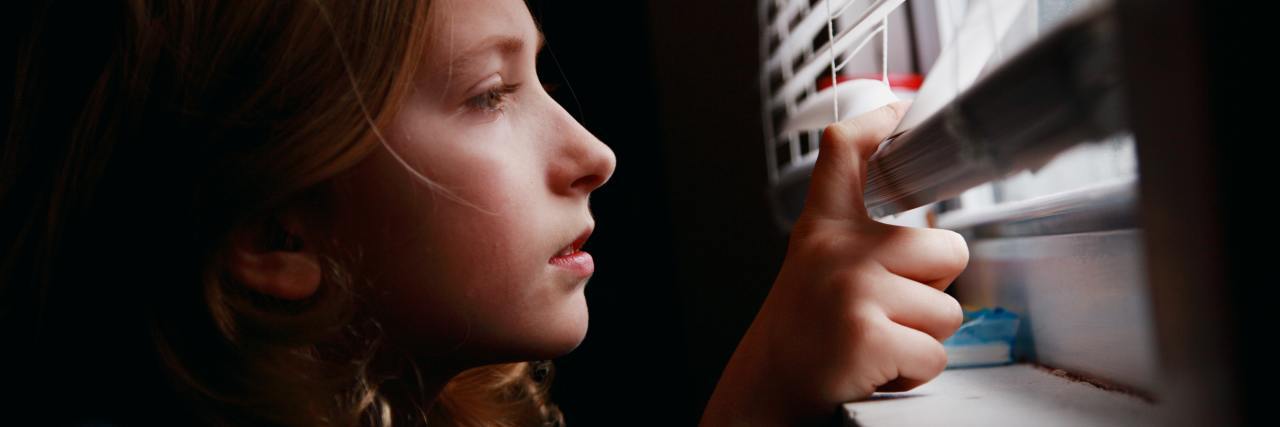Why We Need to Check In With Children During the Coronavirus Pandemic
Editor's Note
If you’ve experienced domestic violence or emotional abuse, the following post could be potentially triggering. You can contact The National Domestic Violence Hotline online by selecting “chat now” or calling 1-800-799-7233.
You can contact the Crisis Text Line by texting “START” to 741741.
Join The Mighty’s Coronavirus group to connect with other Mighties living through the pandemic. Read the latest updates, share helpful tips, or give and receive virtual support.
Sometimes, when you think a secret of yours is accidentally showing, you go to even more trouble to hide it. In fact, some secrets are so well-hidden, you begin to hide them from yourself.
When I received a post-traumatic stress disorder (PTSD) diagnosis, I nearly asked, “For what??” Now, I’ve had over three years to reflect. How did I feel about everything?
My own half-sister had to ask what my trauma diagnosis was related to. A simple answer of “my childhood” wasn’t specific enough. I had forgotten; no one grew up with my father except me.
It has taken me a long time to even begin to understand that the parent I mostly relied on, clung to for protection, held up on a pedestal, and looked to as a primary caregiver was the one destroying my self-esteem and not providing a safe or healthy environment for me.
He needed validation at unpredictable times. If he said or did something, and I didn’t give him the reaction he wanted, he criticized me. He often said I was no fun, miserable or horrible to be around. He said I would end up “just like your mother,” which was the ultimate insult. This must have begun around the time of my parents’ divorce, which happened when I was 4. However, this behavior would alternate between periods of intense affection and love, which is off-putting and confusing.
He had a bad temper, which would cross over into physical violence with inanimate objects. Often, this was when anything became frustrating. If I was present, I was always on guard for if or when the violence may cross over to me, even if it might be an accident. My body was always “ready.” It’s also a reason I stopped going to him for help of any kind.
He had a habit of falling asleep while driving. I wasn’t with him during any of the accidents, but I was with him during many close calls. I had several back-up plans if I needed to operate the car from the passenger seat. It wasn’t until my late teens when I learned that these incidences were partially due to alcohol. When I began to remember, I could recall times where he would drink while driving, in my presence.
Starting in grade school, I spent a significant amount of time alone. He was either in college classes or at work, and my grandmother wasn’t always available to stay with me. Rather than coordinate with my actual mother for coverage of my care (who I was convinced I didn’t want to stay with anyway) I stayed home alone. I learned to cook for myself at a young age. Notes that my father left me, indicating our communication about me staying alone on certain days, were disposed of in a timely manner, so no proof existed.
I was coached to lie about the situation, so teachers and other school officials (and especially my mother) didn’t find out. I was 16 before anyone called DCYF, and by then it was much more severe, as I wasn’t being supervised by either of my parents. Still, even then, I lied my way out of it and protected everyone involved.
Children do not know the reality of the situation they are in. They might know the situation is bad. They know they are unhappy. They might even know it’s wrong, and it shouldn’t be happening. But they may not be able to pinpoint who is responsible because they may think it’s them. They may think it’s their job to fix things, or to wait it out and be strong.
The coronavirus (COVID-19) pandemic is forcing families back into their homes for extended periods of times. Children are being forced to stay in with people who are not putting their interests first, people they have stopped trusting. Children are now being tasked with schooling themselves, more than ever, from a home they may never have considered safe in the first place. School may not have been the safest of places for me, either, but it was a break from the various volatile issues I was dealing with in my family. I’m not sure what I would have been dealing with if that had happened to me.
Check on the kids in your life, even if they’re not yours. They may need you the most right now.
For more on the coronavirus, check out the following stories from our community:
- What to Do If You’re Stuck With an Abusive Person During the Coronavirus Pandemic
- Feeling Calm in the Midst of the Coronavirus Pandemic Might Be a Trauma Response
- What It’s Like to Be a ‘Highly Sensitive Person’ in the Time of COVID-19
- Why the Coronavirus Isolation Feels the Same as My Childhood Abuse
- How the COVID-19 Pandemic Is Triggering My Complex PTSD
Photo by Sharon McCutcheon on Unsplash

